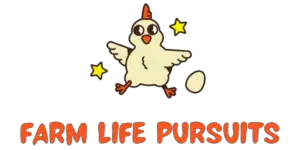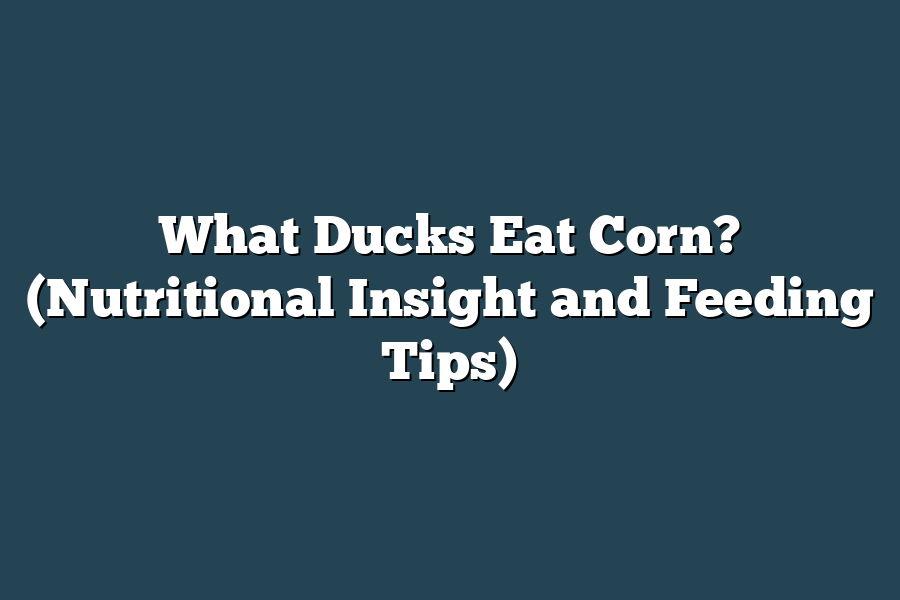Ducks can eat corn as part of their diet, but it should not be the only food they consume. While corn can provide essential nutrients like carbohydrates, ducks also require a balanced diet of seeds, vegetables, insects, and protein to stay healthy. It’s important to supplement their diet with a variety of foods to ensure they receive all the necessary nutrients for optimal growth and development.
Calling all duck lovers!
Ever wondered what our feathered friends chow down on besides charming quacks?
Today, we’re delving into duck nutrition, focusing on the beloved corn.
Discover the secrets of duck diets, from corn’s benefits to feeding tips for happy, healthy ducks.
Stay tuned for all the quack-tastic insights!
🦆🌽
Table of Contents
The Nutritional Value of Corn for Ducks
When it comes to feeding ducks, corn is a popular choice among many bird enthusiasts.
But what exactly is the nutritional value of corn for these webbed wonders?
Let’s dive into the benefits that corn provides to ducks:
High Carbohydrate Content
Corn is rich in carbohydrates, providing ducks with a valuable energy source to fuel their daily activities.
This is especially important during migration periods when ducks require extra energy to travel long distances.
Essential Vitamins and Minerals
In addition to carbohydrates, corn also contains essential vitamins and minerals that are beneficial for the overall health of ducks.
These include:
- Vitamin A: Important for maintaining good vision and immune function.
- Vitamin B: Helps with energy metabolism and overall vitality.
- Vitamin E: Acts as an antioxidant, protecting cells from damage.
- Magnesium: Supports muscle function and nerve transmission.
Protein Content
While corn is not as protein-rich as other grains, it still contains a moderate amount of this essential nutrient.
Protein is crucial for muscle development, feather health, and overall growth in ducks.
Supplementing their diet with protein-rich foods alongside corn can help meet their dietary needs.
Fiber for Digestive Health
Corn is also a good source of dietary fiber, which is essential for maintaining healthy digestion in ducks.
Fiber helps regulate bowel movements, prevent constipation, and promote gut health.
Incorporating corn into their diet can contribute to a well-rounded digestive system.
Source of Energy and Satiety
Due to its carbohydrate content, corn provides ducks with a quick source of energy, helping them stay active throughout the day.
Additionally, the fiber in corn can contribute to a feeling of fullness and satiety, preventing ducks from overeating and aiding in weight management.
corn offers various nutritional benefits for ducks, ranging from energy-providing carbohydrates to essential vitamins and minerals.
By including corn in their diet alongside other nutrient-rich foods, duck enthusiasts can help support the overall health and vitality of these delightful waterfowl.
So, next time you feed the ducks at the pond, consider offering them some wholesome corn for a well-rounded and nutritious meal.
Balancing a Duck’s Diet: Why Corn Shouldn’t Be the Main Staple
As a duck owner or enthusiast, it’s crucial to understand the importance of providing a balanced diet for these feathered creatures.
While corn is often a popular choice to feed ducks, relying solely on this staple food may not be the best option.
In this section, we’ll explore why corn shouldn’t be the main component of a duck’s diet and how to ensure a well-rounded feeding regimen.
The Downside of a Corn-Heavy Diet
Feeding ducks corn exclusively can lead to nutritional deficiencies and health issues.
Although corn is a good source of carbohydrates, it lacks essential nutrients necessary for a duck’s overall well-being.
Here are some key reasons why corn shouldn’t be the primary food for ducks:
Nutritional Imbalance: Corn is deficient in crucial vitamins, minerals, and proteins that ducks need for optimal health and growth. Over time, a diet high in corn can lead to deficiencies, weakening the ducks’ immune system and overall health.
Digestive Problems: Ducks need a diverse diet to support their digestive system. A diet heavy in corn can disrupt their gut health, leading to digestive issues such as bloating, diarrhea, and malnutrition.
The Importance of a Varied Diet
To ensure that ducks thrive, it’s vital to offer a varied diet that includes a mix of grains, vegetables, proteins, and supplements.
Here’s how you can create a balanced meal plan for your feathered friends:
- Grains: Offer a mix of grains such as barley, oats, and wheat to provide a good source of carbohydrates and fiber.
- Vegetables: Incorporate leafy greens, carrots, and peas into their diet to supply essential vitamins and minerals.
- Proteins: Include protein-rich foods like insects, worms, and peas to support muscle development and overall health.
- Supplements: Consider adding specialized duck feed or supplements to ensure that they receive all necessary nutrients.
Expert Insights and Recommendations
According to research by the Wildfowl & Wetlands Trust, a leading conservation organization, ducks thrive on a diverse diet that mimics their natural foraging habits.
By offering a variety of foods, duck owners can promote the health and well-being of their feathered companions.
while corn can be a part of a duck’s diet, it’s essential to balance it with other nutritious foods to prevent nutritional deficiencies and health issues.
By incorporating a diverse range of grains, vegetables, proteins, and supplements, you can ensure that your ducks lead a healthy and fulfilling life.
Feeding Tips: Incorporating Corn Safely into a Duck’s Diet
When it comes to feeding ducks, corn can be a popular choice due to its affordability and availability.
However, it’s essential to ensure that corn is incorporated into a duck’s diet safely to maintain their health and well-being.
Here are some feeding tips to help you responsibly include corn in a duck’s diet:
1. Moderation is Key
Ducks can enjoy corn as part of their diet, but it should not make up the majority of their food intake.
Corn lacks essential nutrients that ducks need to thrive, so it’s crucial to offer a balanced diet that includes a variety of foods such as vegetables, fruits, and proteins.
2. Corn as a Treat
Consider corn as a special treat for ducks rather than a staple food.
Offering corn in moderation can add variety to their diet and keep them engaged during feeding time.
3. Safe Feeding Practices
When feeding corn to ducks, ensure that it is fresh and clean.
Avoid moldy or spoiled corn, as it can be harmful to their health.
Additionally, scatter the corn in the water or on the ground to mimic their natural foraging behavior.
4. Supplement with Nutrient-Dense Foods
To ensure your ducks receive the necessary nutrients, supplement their diet with nutrient-dense foods such as duck pellets, chopped greens, and insects.
These foods provide essential vitamins and minerals that may be lacking in a diet heavy in corn.
5. Monitor Duck Behavior
Pay attention to your ducks’ behavior and overall health when incorporating corn into their diet.
If you notice any signs of digestive issues or a decrease in appetite, consider adjusting their diet to reduce the amount of corn they consume.
6. Consult with a Veterinarian
If you have concerns about feeding corn to ducks or their overall diet, it’s always best to consult with a veterinarian who can provide guidance tailored to your ducks’ specific needs.
By following these feeding tips and incorporating corn safely into your ducks’ diet, you can treat them to a tasty snack while ensuring they receive a balanced and nutritious meal.
Remember, a happy and healthy duck is a well-fed duck!
Variety is Key: Other Foods to Include in a Duck’s Diet for Optimal Health
When it comes to feeding ducks, corn is definitely a favorite among these water-loving birds.
However, just like humans, ducks also need a diverse diet to maintain optimal health.
In this section, we’ll explore the importance of variety in a duck’s diet and discuss other foods that are beneficial for their overall well-being.
Why Variety Matters
While corn can be a nutritious and tasty treat for ducks, relying solely on this one type of food may not provide all the essential nutrients they need.
Just like us, ducks benefit from a balanced diet that includes a variety of food options.
Incorporating different foods into their diet ensures that they are getting a wide range of nutrients necessary for their growth, development, and overall health.
Other Foods to Include
Leafy Greens: Ducks can benefit from leafy greens such as lettuce, kale, and spinach. These greens are rich in vitamins and minerals that support proper digestion and immune function.
Grains: In addition to corn, ducks can also enjoy other grains like oats, barley, and wheat. These grains provide energy and fiber, contributing to a well-rounded diet.
Vegetables: Carrots, peas, and cucumbers are great options to add to a duck’s diet. These vegetables offer additional vitamins and antioxidants to support their overall health.
Protein Sources: Ducks require protein for muscle development and feather health. Foods like peas, mealworms, and even small fish can be included in their diet to meet their protein needs.
The Importance of Balanced Nutrition
Just like humans, ducks thrive on a diet that is diverse and balanced.
By incorporating a variety of foods such as leafy greens, grains, vegetables, and protein sources into their meals, you can ensure that your feathered friends are receiving the essential nutrients they need to stay healthy and active.
So, while corn may be a duck’s favorite snack, remember to mix it up with other nutritious foods to keep them happy and healthy.
After all, a well-fed duck is a happy duck!
In the next section, we’ll delve into the importance of proper hydration for ducks and discuss the best ways to ensure they have access to clean water for drinking and bathing.
Stay tuned for more tips on caring for your feathered companions!
Final Thoughts
While corn can be a beneficial energy source for ducks, it’s essential to remember that balance is key when it comes to their diet.
By incorporating a variety of foods along with corn, you can ensure that your feathered friends receive all the necessary nutrients for their health and well-being.
Remember, a well-rounded diet leads to happy and healthy ducks!
So, why not try mixing things up in their feeding routine by including a diverse range of foods to keep them thriving?
Your ducks will thank you with quacks of appreciation!

